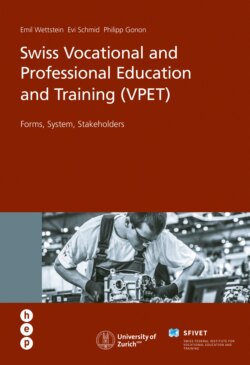Читать книгу Swiss Vocational and Professional Education and Training (VPET) - Philipp Gonon, Emil Wettstein - Страница 35
На сайте Литреса книга снята с продажи.
1.10 Federal PET Diploma and Advanced Federal PET Diploma 1.10.1 Definition
ОглавлениеThe Federal PET Diploma (Berufsprüfung) and the Advanced Federal PET Diploma (höhere Fachprüfung) are part of tertiary-level professional education and training (PET) (cf. Chapter 2.1, p. 96). While at professional colleges (höhere Fachschulen) the contents of the degree programmes are regulated, in the case of the Federal PET Diploma and the Advanced Federal PET Diploma only the examinations are regulated: the examination regulations and corresponding guidelines specify the admission, examination method, examination content and assessment. Admission requirements are usually a specific VET Diploma (EFZ) and always a specified amount of professional experience. Unlike at professional colleges, it is left to the candidates to decide how they want to prepare for the examination, except with the “modular system”, in which successful attendance of specific courses or equivalent qualifications constitute the admission requirements for the examination (cf. Chapter 2.4.2, p. 129).
Associations, vocational schools and private providers offer preparatory courses. They are generally attended on a part-time basis and in some cases last several years.
Successfully passing the exam leads to either a Federal PET Diploma (eidgenössischer Fachausweis) and the corresponding title, e.g. “Mountain Guide with Federal PET Diploma” (Bergführer mit eidgenössischem Fachausweis) or an Advanced Federal PET Diploma” (eidgenössisches Diplom) and the corresponding title, e.g. “Qualified Master Farmer” (Diplomierte Meisterlandwirtin). The titles are protected, the names of the holders are published and entered in a register kept by the State Secretariat for Education, Research and Innovation (SERI).
Organisation and implementation of examinations
The initiative to create an exam for a Federal PET Diploma or an Advanced Federal PET Diploma comes in each case from a professional organisation. It can submit a draft to the SERI. In the implementation, the guidelines of the SERI have to be adhered to.
The SERI checks if the submitted draft corresponds with the requirements and publishes the regulations in the “Federal Gazette” (Bundesblatt). If no objections to creating the examination are submitted, the examination regulations are approved by the SERI.
Not all examinations attract interest. Some are only rarely carried out because of the lack of interested candidates. Of the 164 Advanced Federal PET Diplomas existing in 2013 with valid examination regulations, only 114 examinations were carried out between 2010 and 2012 according to our calculations. The great deal of work required for the preparation is justified only if the obtained diploma is accepted in the world of work and leads to considerable advantages for the holder’s career. This is most likely the case when the examination is carried out by the dominant association of the respective branch or by the leading group of associations. A strong organisation is necessary also because the organisation and implementation of examinations require considerable administrative effort and financial expenditure.
Recognition of obtained qualifications
Behind Federal PET Diplomas and Advanced Federal PET Diplomas are the Confederation and usually also the most important professional and trade associations of the respective branch. Some diplomas are held in high regard, comparable to university degrees. The acquisition of a Federal PET Diploma or Advanced Federal PET Diploma is, therefore, important for professional careers. It is also financially interesting, since professional education qualifications are “clearly given a higher monetary value than those of the tertiary level A system” by the labour market (Cattaneo & Wolter, 2011, p. 65).
In some economic sectors, however, Advanced Federal PET Diplomas are in competition with degrees from universities of applied sciences, for example in the areas of horticulture and finance: universities of applied sciences are completed with well-known and internationally recognised titles (Bachelor, Master). In other countries, university qualifications are often standard for comparable positions – for example in finance and controlling. Moreover, preparatory courses for the federal examinations are also subsidised to a lesser extent than programmes at professional colleges and in particular at universities of applied sciences (cf. Chapter 2.6.1, p. 137) because – unlike the examinations themselves – the preparatory courses are allocated to continuing education and training in the education system (cf. Chapter 1.15, p. 83).
Figure 1-8: The development of the tertiary level in the last 100 years
